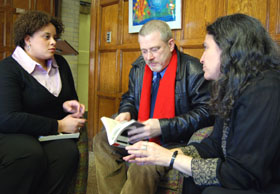Reading About Racism
Employee reading group examines racism and white privilege

When Bernie Stewart heard about a study circle that met at Duke to discuss racism, he wanted to learn more. He joined one session, then another. Before long, he attended nearly 24 meetings.
"What hooked me was the fact that I found other white people who shared the same passion as me," said Stewart, a registered nurse and patient safety associate for Duke Private Diagnostic Clinic. "As a 60-year-old white man born and bred in the South, I have lived through and observed first-hand the evil and cruelty of racism. Sadly, as a product of my environment, I have often contributed to racism by refusing to stand up to it. Through reading, dialogue and introspection, I've become more enlightened to an evil that remains quite prevalent and destructive in our society."
Stewart was one of 23 Duke University and Health System employees who met over lunch for six weeks in January and February to discuss how racism and white privilege have affected whites and people of color, and how to confront racism.
The study circle, whose participants meet on campus during the lunch hour, was introduced by Polly Weiss, director of diversity and equity programs for Duke's Office for Institutional Equity. Since 2003, she has facilitated 14 circles, each meeting weekly.

Weiss uses books and invites circle participants to tell their personal experiences as a backdrop for dialogue about subtle privileges white people enjoy and how people can "interrupt racism" at work and in their communities.
"White privilege is a system of unearned privileges that most whites are unaware of," Weiss said. "For example, not being followed by security guards in retail places; being given the benefit of the doubt when stopped by a police officer; or it can be institutional oppression -- not having systems of accountability for recruiting or promoting under represented minorities."
Aziza Jones, a circle participant and social work intern at Duke, learned about the study circle from her supervisor. "As a person of color, I am constantly forced to think about race and racism," she said. "For example, I frequently find myself asking, ‘Did I get poor service because that salesperson is having a bad day, or is it because I am African American?' "
Jones said she was pleasantly surprised Duke offers employees an opportunity to challenge themselves.
"Few institutions are willing to provide such a space for dialogues about race and the effects of racism within the workplace," Aziza said. "Learning about the existence of this group made me hopeful and excited that in this post-civil rights era, there are still individuals and institutions working toward racial equality."